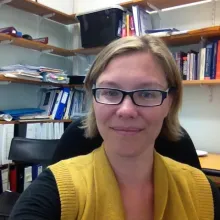
Society, Culture & Health
Using social science theory and methods to understand the social and cultural determinants of health and how society produces the lived experience of health.
About
The society, culture and health research group contributes new thinking using social science theory and methods to understand the social and cultural determinants of health and how society produces the lived experience of health. We seek to understand how health is experienced and produced within an ecological public health framework - adopting both qualitative and quantitative methodologies. Much of our research incorporates a focus on health inequities - with a focus on inequities generated by gender, age, social roles (e.g. paid and unpaid work), evolving cultural practices, and both economic and non-economic resources (e.g. income, time, social support).
Projects and sub-themes include:
- Addressing the Hour-glass Ceiling: New case for action on gender inequality
- Work hours and health for construction workers
- Work hours, working conditions, work attributes and effects on health
- Working longer, working well, and keeping productive
- MC2020 Partners Study - new parents’ health following smoke & bushfire events
- Social singing to support the wellbeing of migrant and refugee mothers
- The Great Disruption: Work, caregiving and health post COVID
- Socio-cultural contributors to obesity in Australia and Thailand
- The COVID-19 Clinical Response Review
- The Relations Study: Women who use drugs and their children within the health and welfare system
Publications
Bennetts, S.K., Hokke, S., Crawford, S., Hackworth, N.J., Leach, L.S. Nguyen, C. Nicholson J.M. & Cooklin, A.R. (accepted 11th December 2018). Using paid and free Facebook methods to recruit Australian parents to an online work-family survey: An evaluation. Journal of Medical Internet Research.
Brown R. Muller, T & Olsen, A. (2019). Australian women’s cervical cancer screening attendance as a function of screening barriers and facilitators. Social Science & Medicine 220, 396-402.
Alam M, Banwell C, Olsen A & Lokuge K (2019) Patients and doctors perception on utility of Telemedicine service for maternal and child healthcare in Bangladesh: a qualitative exploratory study. JMIR mHealth and uHealth (accepted).
Chun J, Olsen A, Taing MW, Clavarino A, Hollingworth S, Dwyer R, Middleton M & Nielsen S. (2019) How prepared are pharmacists to provide over-the-counter naloxone? The role of previous education and new training opportunities. Research in Social and Administrative Pharmacy (accepted)
Olsen A, Lawton B, Dwyer R, Taing MW, Chun J, Hollingworth S & Nielsen S. (2019) Why aren’t Australian pharmacists supplying naloxone? Findings from a qualitative study. International Journal of Drug Policy (accepted).
Zhao, Y, Richardson, A., Poyser, C., Butterworth, P., Strazdins, L., & Leach, L. (Accepted 10 April 2019). Shift work and mental health: a systematic review and meta-analysis. International Archives of Occupational and Environmental Health.
Sarma, H., Gerth-Guyette, E., Shakil, S.A., Alom, K.R., Abu-Haydar, E., D’Rozario, M., Tariqujjaman, M, Arifee, S. E., and Ahmed, T. “Evaluating the use of job aids and user instructions to improve adherence for the treatment of childhood pneumonia using amoxicillin dispersible tablets in a low-income setting: a mixed method study”. BMJ Open 2019;9:e024978. doi:10.1136/bmjopen-2018-024978.










